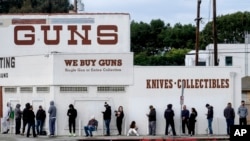A federal appeals court on Saturday cleared the way for a California law that bans the carrying of guns in most public places. The law can take effect at the start of 2024 because the panel put on hold a judge's ruling declaring the measure unconstitutional.
The 9th U.S. Circuit Court of Appeals suspended a December 20 injunction issued by a judge who concluded the Democratic-led state's law violated the right of citizens to keep and bear arms under the U.S. Constitution's Second Amendment.
The three-judge panel issued an administrative stay that put the injunction on hold until a different 9th Circuit panel can consider whether to issue an even longer pause while the litigation plays out.
The measure, which was set to take effect January 1 after being signed into law in September by Democratic California Governor Gavin Newsom, was enacted after a landmark ruling in June 2022 by the conservative-majority U.S. Supreme Court that expanded gun rights nationwide.
The Supreme Court in that case struck down New York's strict gun permit regime and declared for the first time that the right to keep and bear arms under the Second Amendment protects a person's right to carry a handgun in public for self-defense.
The ruling, New York State Rifle & Pistol Association v Bruen, also set out a new test to assess the constitutionality of gun laws by holding they must be "consistent with the nation's historical tradition of firearm regulation."
California, which has some of the strictest gun control laws in the United States, was among a group of states with laws similar to New York. After the U.S. Supreme Court's decision, California moved to revamp its firearms regulations.
Under California's new law, people could not carry concealed guns in 26 categories of "sensitive places" including hospitals, playgrounds, stadiums, zoos and places of worship, regardless of whether they had permits to carry concealed weapons.
The law, Senate Bill 2, also barred people from having concealed guns at privately owned commercial establishments that are open to the public, unless the business's operator posts a sign allowing license holders to carry guns on their property.
A group of concealed carry permit holders and gun rights groups including the Second Amendment Foundation, Gun Owners of America and the California Rifle & Pistol Association sued, arguing the new law was unconstitutional.
U.S. District Judge Cormac Carney, an appointee of Republican former President George W. Bush, on December 20 agreed and blocked the law pending the outcome of the case.
The law "turns nearly every public place in California into a 'sensitive place,' effectively abolishing the Second Amendment rights of law-abiding and exceptionally qualified citizens to be armed and to defend themselves in public," Carney wrote.
California Attorney General Rob Bonta quickly asked the 9th Circuit to put that injunction on hold pending an appeal, saying that leaving the law blocked would mean that "tens of millions of Californians will face a heightened risk of gun violence."
Similar laws adopted by other states have faced litigation as well. A federal appeals court on December 8 ruled that New York state could bar gun owners from carrying weapons in many "sensitive locations" including parks, zoos, bars and theaters.





